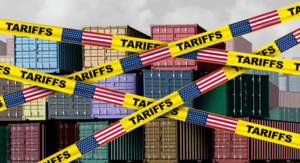
The Economics of Techno-Colonialism
Economics of Techno-Colonialism delves into the increasing control that wealthy nations exert over developing countries through technological dominance. No longer driven by land or physical resources, this modern colonialism revolves around data, digital infrastructure, and intellectual property.
Global tech giants and affluent economies leverage their technological superiority to extract wealth, deepening inequalities and eroding economic sovereignty in the Global South. As developing nations become ever more reliant on external technology, the economic power shifts further towards those who control the digital landscape, raising pressing questions about fairness and autonomy in our interconnected world.
Techno-Colonialism
In an era dominated by rapid technological advancements and digital transformation, a new form of economic dominance is emerging: techno-colonialism. This phenomenon involves the exploitation of technology to exert economic control and influence over less-developed nations and economies.
Here are seven key points to understand the economics of techno-colonialism:
Table of Contents
1. Defining Techno-Colonialism
Techno-colonialism can be defined as the practice where advanced technological powers or corporations exploit and dominate less technologically developed regions. This exploitation can manifest through the control of digital infrastructure, data, and technological resources.
Unlike traditional colonialism, which involved physical control over territories, techno-colonialism operates through digital and technological means, often involving multinational tech giants and state actors from developed nations.
Read More: A New Economics Of Industrial Policy
2. Economic Disparities and Technological Dependence
The global digital divide highlights the economic disparities between developed and developing nations. According to the International Telecommunication Union (ITU), as of 2023, only 40% of people in low-income countries have access to the internet, compared to 90% in high-income countries.
The digital divide creates a dependency where developing nations rely heavily on technology and infrastructure provided by tech giants based in developed countries. For instance, 70% of Africa’s internet infrastructure is controlled by a few large multinational corporations, which dictates pricing, access, and digital services.
Read More: The Dark Side of Monopolistic AI Innovations
3. Data Extraction and Economic Exploitation
Data is a crucial asset in the modern economy. However, the control and extraction of data from developing nations often occur without adequate compensation. Tech giants like Google, Facebook, and Amazon collect vast amounts of data from users worldwide, including those in developing countries.
According to a 2023 report by Data and Society, the economic value of data extracted from developing countries is estimated at over $500 billion annually. However, these nations receive a fraction of the financial benefits, often resulting in economic exploitation and a lack of reinvestment in local digital infrastructure.
4. Influence on Local Economies and Employment
The dominance of multinational tech companies can stifle local entrepreneurship and innovation. For example, in countries like India and Nigeria, local tech startups face significant competition from global giants, which often outspend and outmaneuver them in terms of technology and marketing.
According to a 2023 World Bank report, over 60% of tech startups in emerging markets struggle to scale due to the overwhelming presence of large foreign tech firms. This not only affects local job creation but also hampers the development of indigenous technological capabilities.
Read More: A New Economics Of Industrial Policy
5. Regulatory Challenges and Sovereignty
Techno-colonialism also presents significant challenges for regulatory frameworks and national sovereignty. Many developing nations lack the capacity to regulate and protect their digital environments effectively. For instance, the European Union’s General Data Protection Regulation (GDPR) has set a high standard for data privacy, but similar regulations are sparse in many developing countries.
Only 30% of countries in Sub-Saharan Africa have enacted comprehensive data protection laws, leaving them vulnerable to exploitation by multinational tech corporations.
6. Digital Infrastructure and Economic Dependency
The construction and maintenance of digital infrastructure, such as undersea cables and data centers, are often controlled by large tech companies. For example, Google and Facebook, through their partnerships with telecom companies, have been involved in laying undersea cables that connect continents.
These cables are crucial for global internet connectivity. However, the control of such infrastructure often means that developing countries are dependent on these corporations for their digital connectivity. The cost of leasing bandwidth from these international firms can be exorbitant, affecting the affordability and accessibility of internet services in these regions.
Read More: The Rise of the Finternet
7. Potential for Reform and Technological Sovereignty
Addressing techno-colonialism requires concerted efforts from both developing and developed nations. Initiatives like the Global Partnership for AI aim to bridge the technological divide by promoting equitable access to technology and fostering local innovation. Furthermore, fostering technological sovereignty through investments in local tech ecosystems and supporting international cooperation can help mitigate the effects of techno-colonialism.
For example, the African Union’s Digital Transformation Strategy, launched in 2023, aims to bolster regional technological capabilities and reduce dependency on foreign tech giants by enhancing local digital infrastructure and promoting homegrown innovation.
Bottom Line
The economics of techno-colonialism reveals a complex interplay between technological advancement and economic domination. While technology has the potential to drive progress and development, the current landscape often reinforces existing global inequalities. By understanding and addressing the factors contributing to techno-colonialism, we can work towards a more equitable digital future where technological benefits are shared more fairly across the globe.
Collaborative efforts to improve digital infrastructure, enact robust data protection regulations, and support local tech ecosystems are crucial steps in countering the effects of techno-colonialism and ensuring a more inclusive and balanced global digital economy.





